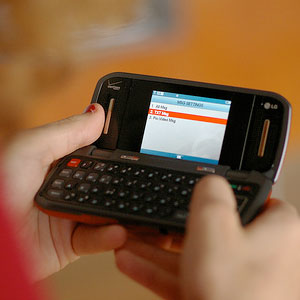students addicted to technology
 As if The Mosquito Ringtone isn’t enough (see a few blogs back: 5/22/10), teachers also have to worry about making sure students aren’t texting in class. At Monroe Community College, once in a while, I’ve seen students swishing around in their backpacks and purses for extended periods of time. I usually approach these students and quietly tell them to turn off their cell phones. I want my students to know that I notice what they are doing, that their behavior matters to me.
As if The Mosquito Ringtone isn’t enough (see a few blogs back: 5/22/10), teachers also have to worry about making sure students aren’t texting in class. At Monroe Community College, once in a while, I’ve seen students swishing around in their backpacks and purses for extended periods of time. I usually approach these students and quietly tell them to turn off their cell phones. I want my students to know that I notice what they are doing, that their behavior matters to me.
In “How to Successfully Text During Class: Using Your Purse,” Laura Mae instructs students on how they can master stealth-mode texting. She writes:
First, [get a big floppy purse]. Instead of holding your purse in your lap, try laying it sideways on your desk. Keep the opening … facing toward you. Place your phone near the opening. … Your teacher won’t be able to … see your phone … because he/she will be at his/her desk. So you’re good there. If they suspect something and get up to walk around, casually, without looking, push your cellular device back into your purse with your finger just enough so you’re [sic] phone is covered.
If you have a Qwerty keyboard, you can text, but not as easily as if you have an original keypad. If you do have an original keypad, … memorize how many times you need to press each button for the desired letter. I believe every phone has that little bump in the number 5, so that should be easy to navigate to the letters if you find it. Example: While your [sic] not looking, move your finger to the number five. Move up one key. Press three times. Wait a few seconds. Press once. Move back to the center. Move down one key. Press once. I just spelled “cat.”
The dozens of grammar errors in Laura Mae’s article make it clear to me that Laura Mae has not been listening to her instructors for a while. How  could she possibly be paying attention when her brain is expending so much energy on composing blind messages as well as thinking about where she has to place her fingers and how many times she has to tap-tap-tap in order to send her messages so that they will be coherent upon receipt? Or maybe it isn’t so much that she isn’t paying attention, but that she seems to care more so much more about her social life than fine-tuning or editing her ideas, important skills which she will need to draw upon in the future.
could she possibly be paying attention when her brain is expending so much energy on composing blind messages as well as thinking about where she has to place her fingers and how many times she has to tap-tap-tap in order to send her messages so that they will be coherent upon receipt? Or maybe it isn’t so much that she isn’t paying attention, but that she seems to care more so much more about her social life than fine-tuning or editing her ideas, important skills which she will need to draw upon in the future.
The pervasiveness of text-messaging in class poses problems for teachers, particularly in the area of test security, as students can send answers or hints to fellow students via cell phones, destroying the integrity of an entire test with a few keystrokes. Obviously, cheating damages classroom culture, but this is not really the main issue in my essay driven classroom. More annoying is the fact that instruction is interrupted when someone is caught texting. Then the problem extends beyond breaking the rules and not paying attention because instructors have to stop teaching to handle the situation, disrupting the learning environment, wasting time and tuition.
Some people will give me their best Darwinian argument: Students who honestly pay attention will do well on their tests and papers and end up doing better in life then those who are screwing around with their cell phones in class, so let the texters text and grow up to be ditch-diggers. I’m sorry, but I just can’t buy into that argument: Not at the college level and not at the high school or middle school levels either. And my reasons only partially have to do with concern over future skills. I’m genuinely concerned with civility and respect: Two other important values Americans seem to be eagerly flushing down the toilet.
Is it really so much to ask to turn off the technology and respectfully tune-in to and engage with other humans for 50 minutes?
idk.